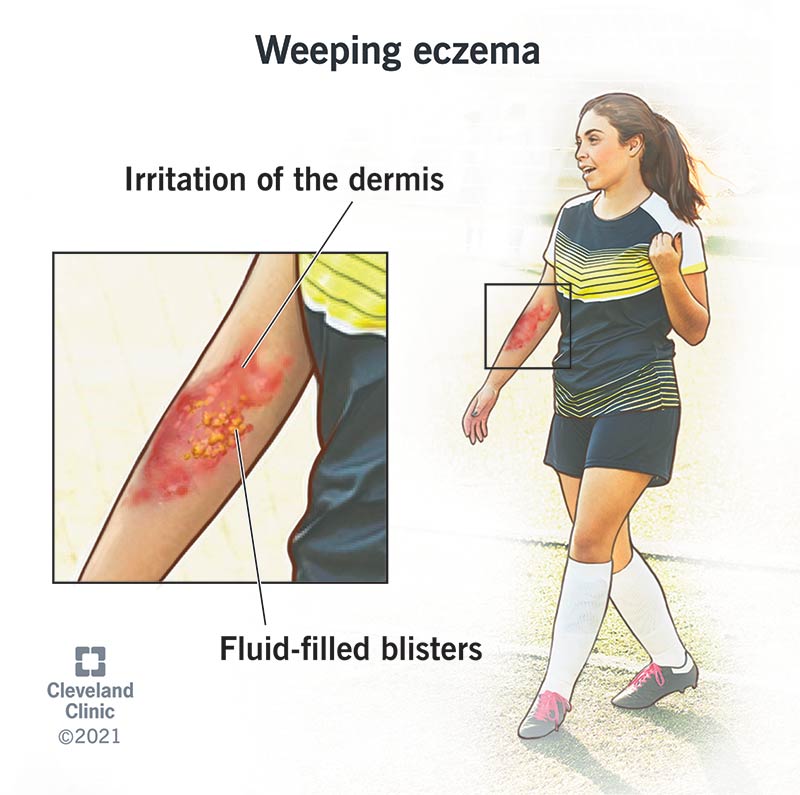Weeping eczema is a complication of eczema (dermatitis) that is characterized by fluid-filled blisters on the skin. The condition is caused by prominent inflammation and can make your eczema symptoms worse. Treatments include corticosteroids, antihistamines, and immunosuppressive medications.
Advertisement
Cleveland Clinic is a non-profit academic medical center. Advertising on our site helps support our mission. We do not endorse non-Cleveland Clinic products or services. Policy

Image content: This image is available to view online.
View image online (https://my.clevelandclinic.org/-/scassets/images/org/health/articles/21991-weeping-eczema)
Weeping eczema is a term used to describe eczema that oozes clear- to straw-colored fluid. Occasionally weeping eczema is associated with presence of small blisters filled with clear fluid. Weeping eczema is a complication of typical eczema, not a separate condition.
Advertisement
Cleveland Clinic is a non-profit academic medical center. Advertising on our site helps support our mission. We do not endorse non-Cleveland Clinic products or services. Policy
Impetigo and weeping eczema are both skin conditions. While eczema is a type of dermatitis, impetigo is an infection of the skin. With impetigo, blisters and sores usually develop on the nose and mouth. Weeping eczema can occur anywhere on the body and is sometimes accompanied by red or purple blisters that ooze or “weep” clear- to straw-colored fluid.
Occasionally, areas affected by eczema can become infected and ooze pus-colored fluid. When this happens, a different type of treatment is usually needed.
This condition is very common. Over 31 million Americans live with some type of eczema or dermatitis, including atopic dermatitis, contact dermatitis and seborrheic dermatitis. All types of eczema can weep, though severity and symptoms can vary.
The fluid-filled blisters that appear with weeping eczema ooze, causing wetness on the skin. The fluid dries and results in a yellow-to-orange crusty layer on your skin. Eczema is most common in areas where your skin flexes, such as behind the knees, inside the elbows and in front of the neck. However, it may develop anywhere on your body, including your:
People with weeping eczema may notice several different symptoms. Common signs include:
Advertisement
In most cases, people with weeping eczema notice other eczema symptoms worsening, such as swelling or dry, itchy skin. Those who have severe cases of weeping eczema may also develop:
Weeping eczema is the result of active inflammation in the skin. Prominent inflammation results in dilation of skin blood vessels. These dilated blood vessels then leak serum into the soft tissue of the skin, causing mild swelling (edema) and oozing of the serum onto the skin surface.
Importantly, when your skin becomes too dry, cracked or inflamed, infection can enter the skin and cause your eczema symptoms to worsen. Infection can occur with weeping eczema, but is a different condition. The most common infection in people with weeping eczema is staph (staphylococcus), a common bacteria. The herpes simplex virus (HSV-1) — the same virus that causes cold sores — can also cause weeping eczema if it enters the skin.
Eczema and “weeping eczema” themselves aren’t contagious. However, a secondary infection associated with weeping eczema can potentially spread.
Your healthcare provider will examine your skin to check for eczema symptoms. In some cases, tests may be necessary to confirm the diagnosis. These may include:
Weeping eczema treatment depends on what caused your condition. There are several options that can help manage your symptoms. These include:
If a secondary infection has developed, other medications may be needed.
Because weeping eczema is infection-related, the only thing that will clear it up completely is prescription medication. However, there are some things you can do at home to ease your symptoms. Weeping eczema home remedies include:
Advertisement
When treated promptly, weeping eczema should clear up within two weeks. People with severe cases may develop scarring.
Left untreated, weeping eczema can lead to more severe symptoms and an increased risk of developing secondary infections. If you develop the condition, it’s important to seek medical care immediately.
While you may not be able to prevent eczema, you can prevent it from becoming infected and weeping. Routine skincare management can help keep your condition in check. Here are some recommendations:
If you have eczema that starts to weep, call your healthcare provider right away. Prompt treatment will help get your infection under control and ease uncomfortable symptoms.
First, see your healthcare provider so you can begin appropriate treatment. In the meantime, keep your lips moisturized with lip balm or petroleum jelly. Your provider may also recommend a topical cortisone cream.
Advertisement
If your baby’s eczema starts to weep, call your healthcare provider so they can help get it under control. To ease symptoms, you can apply steroid cream or ointments. You may also want to consider giving your baby antihistamines for a few days to relieve itching.
Typical eczema is itchy and inconvenient. But when it begins to weep, it becomes a more serious health problem. If you develop weeping eczema, schedule a visit with your healthcare provider right away. Timely treatment will clear up your infection and reduce painful symptoms so you can get back to normal life.
Advertisement

Sign up for our Health Essentials emails for expert guidance on nutrition, fitness, sleep, skin care and more.
Learn more about the Health Library and our editorial process.
Cleveland Clinic’s health articles are based on evidence-backed information and review by medical professionals to ensure accuracy, reliability and up-to-date clinical standards.
Cleveland Clinic’s health articles are based on evidence-backed information and review by medical professionals to ensure accuracy, reliability and up-to-date clinical standards.
Every day, people see your skin, hair and nails. At Cleveland Clinic, our expert and caring dermatology team will make sure they’re healthy and strong.
